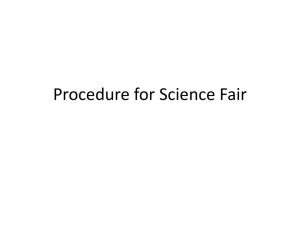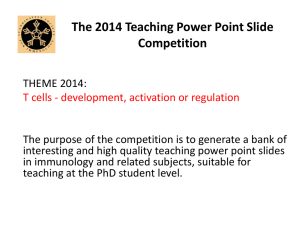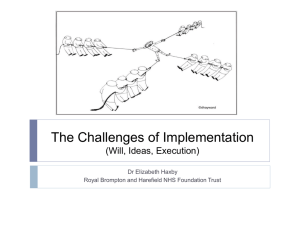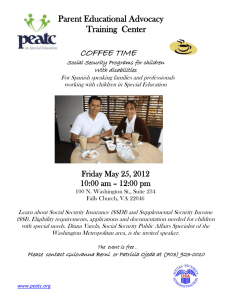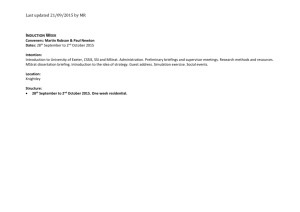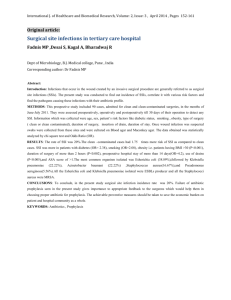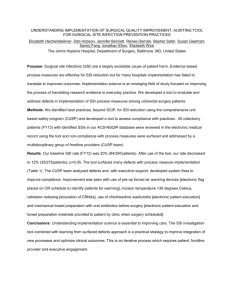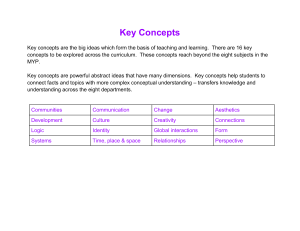spring 2016 common core course offerings
advertisement
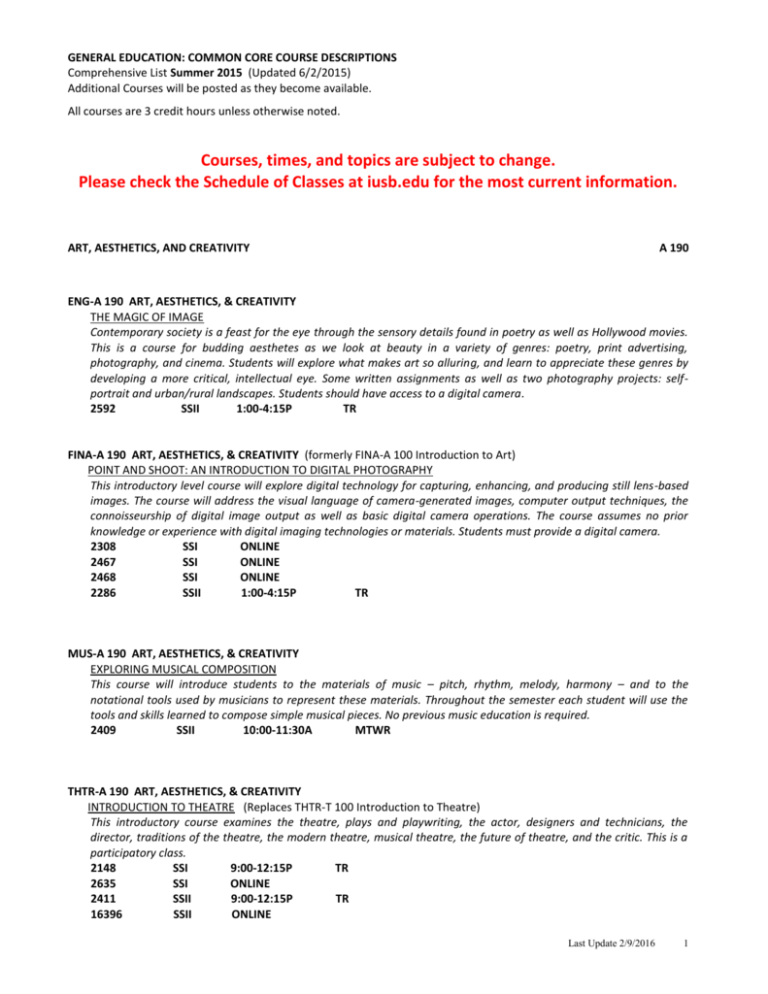
GENERAL EDUCATION: COMMON CORE COURSE DESCRIPTIONS Comprehensive List Summer 2015 (Updated 6/2/2015) Additional Courses will be posted as they become available. All courses are 3 credit hours unless otherwise noted. Courses, times, and topics are subject to change. Please check the Schedule of Classes at iusb.edu for the most current information. ART, AESTHETICS, AND CREATIVITY A 190 ENG-A 190 ART, AESTHETICS, & CREATIVITY THE MAGIC OF IMAGE Contemporary society is a feast for the eye through the sensory details found in poetry as well as Hollywood movies. This is a course for budding aesthetes as we look at beauty in a variety of genres: poetry, print advertising, photography, and cinema. Students will explore what makes art so alluring, and learn to appreciate these genres by developing a more critical, intellectual eye. Some written assignments as well as two photography projects: selfportrait and urban/rural landscapes. Students should have access to a digital camera. 2592 SSII 1:00-4:15P TR FINA-A 190 ART, AESTHETICS, & CREATIVITY (formerly FINA-A 100 Introduction to Art) POINT AND SHOOT: AN INTRODUCTION TO DIGITAL PHOTOGRAPHY This introductory level course will explore digital technology for capturing, enhancing, and producing still lens-based images. The course will address the visual language of camera-generated images, computer output techniques, the connoisseurship of digital image output as well as basic digital camera operations. The course assumes no prior knowledge or experience with digital imaging technologies or materials. Students must provide a digital camera. 2308 SSI ONLINE 2467 SSI ONLINE 2468 SSI ONLINE 2286 SSII 1:00-4:15P TR MUS-A 190 ART, AESTHETICS, & CREATIVITY EXPLORING MUSICAL COMPOSITION This course will introduce students to the materials of music – pitch, rhythm, melody, harmony – and to the notational tools used by musicians to represent these materials. Throughout the semester each student will use the tools and skills learned to compose simple musical pieces. No previous music education is required. 2409 SSII 10:00-11:30A MTWR THTR-A 190 ART, AESTHETICS, & CREATIVITY INTRODUCTION TO THEATRE (Replaces THTR-T 100 Introduction to Theatre) This introductory course examines the theatre, plays and playwriting, the actor, designers and technicians, the director, traditions of the theatre, the modern theatre, musical theatre, the future of theatre, and the critic. This is a participatory class. 2148 SSI 9:00-12:15P TR 2635 SSI ONLINE 2411 SSII 9:00-12:15P TR 16396 SSII ONLINE Last Update 2/9/2016 1 ART, AESTHETICS, AND CREATIVITY A 390/399 ENG-A 399 ART, AESTHETICS, & CREATIVITY CREATE YOUR OWN BOOK OF NARRATIVE COLLAGE Narrative has to do with telling stories, and collage is about juxtaposing different images and ideas. The writer Donald Barthelme said, “the point of collage is that things are stuck together to create a new reality.” In this class we will collect “things”—memories, poems, photos, objects, images—and stick them together to tell stories and create new realities. We’ll study many examples of literary and visual collage as we explore new ways to tell stories. Students in this course will write poetry and prose, take photographs, collect objects, and work throughout the semester toward a final project: you will write, design, and self-publish your own book of narrative collage. Note on content and materials: This course includes advanced reading assignments and reflective writing. Students must have regular access to a camera and should expect to pay up to $20 extra for materials and self-publishing. 2593 SSI 1:00-4:15P TR FINA-A 399 ART, AESTHETICS, & CREATIVITY OVERSEAS STUDY: STREET PHOTOGRAPHY IN FLORENCE In this study abroad course activities and study will include reading and writing about photography, Florence and the Renaissance. Students will learn the very basics of their camera and image processing. In the month of June the class will reside in Florence with short day trips to towns in Tuscany. Students will look at art, make photographs and experience the culture. Students enrolled in this course will research the history of art and contemporary art in terms of the Italian Renaissance, photojournalism and street photography. Students will explore photography: basic camera and print processing techniques, formal visual qualities, aesthetics, and contemporary issues in photography. THTR-A 399 ART, AESTHETICS, & CREATIVITY THEATRE PRODUCTION IN ELKHART Explores the making of the art of Theatre. Issues of practice of the craft receives greater emphasis at this level. 2528 SSII ARR ELKHART HUMAN BEHAVIOR AND SOCIAL INSTITUTIONS B 190 BUS-B 190 HUMAN BEHAVIOR & SOCIAL INSTITUTIONS INTRODUCTION TO BUSINESS ADMINISTRATION Business organizations play an important role in our lives. We interact with businesses in a variety of ways, including as employees, consumers, and investors. One form of business organization—corporations—wield enormous power. Given the pervasiveness of business in our lives, one intention of this class is to help you make greater sense of the world in which you live and enable you to make better informed decisions. In particular, W100 introduces you to a wide range of management issues. This will help to prepare you for other business classes that you may take and for your career. Or, for nonbusiness students, it will give you a useful overview of key business issues and the context within which businesses operate. Also this class may help you choose your career by making you aware of key features of: business trends, business ownership, business management, management of human resources, marketing, and managing financial resources. 2391 SSI 1:00-4:15P T and Online Last Update 2/9/2016 2 PSY-B 190 HUMAN BEHAVIOR & SOCIAL INSTITUTIONS DEATH AND LIFE LESSONS This course focuses on death and end-of-life issues within a variety of perspectives, including historical, biomedical, multicultural, and religious theories. Existential issues related to the human significance of death for individuals and community will be addressed. Students will be introduced to a basic overview of laws and ethics regarding end-of-life issues, and participate in group discussions using critical thinking skills acquired in class. Guest speakers will include professionals working in funeral preparation, hospice, and grief and bereavement programs. 2266 SSII 9:00-12:15P MW ELKHART HUMAN BEHAVIOR AND SOCIAL INSTITUTIONS B 399 BUS-B 399 HUMAN BEHAVIOR & SOCIAL INSTITUTIONS BUSINESS & SOCIETY This course examines business in terms of its stakeholders throughout society. By the end of this course, you should know the major stakeholders of a business and key concepts of business ethics. You should be able to think critically about issues of business and society, appreciate and be able to synthesize opposing points of view, and work successfully in a team. 14587 SSI 1:00-4:15P MW NURS-B 399 HUMAN BEHAVIOR & SOCIAL INSTITUTIONS DEATH, DYING & BEREAVEMENT In this course, we will discuss the universal experience of mortality and loss. Topics will include attitudes toward death and those who are dying; the process of dying; palliative care and Hospice; emotional & physical care for the dying including both Western & complementary & alternative medicine; suicide, homicide, and sudden or traumatic deaths; funeral rituals; grief and bereavement; the unique experiences of children; the roles of the interdisciplinary team; the use of art, literature, and music at the end-of-life and during the grieving process; and, varying cultural experiences at the end-of-life. 14850 SSI 9:45-11:15A M and ONLINE 15511 SSI 9:45-11:15A M and ONLINE POLS-B 399 HUMAN BEHAVIOR & SOCIAL INSTITUTIONS URBAN POLITICS AND POLICY This course considers the politics of cities, suburbs, and regions in the United States from numerous perspectives. Cities are at the heart of American democracy; they are the units of government closest to the people, making citizens more likely to interact with their local governments than the national or a state government on a daily basis. However, cities also serve as hubs of commerce, and many argue their governments cater decisions to the interests of the private sector. Finding ways to serve residents while crafting development plans to suit businesses is one of the central challenges of governing cities. Because of cities’ dynamic and ever-changing nature, we will take a historical approach to urban politics while considering a wide range of theories of city development. Discussions of political power will be at the center of units considering the initial development of U.S. cities, political institutions, federalism, race, metropolitan expansion, globalization, and residential displacement. Though this is a course on politics, understanding the structure of power in cities requires inquiries going beyond the basic institutions of local government. Readings and discussions also borrow from sociology, urban planning, economics, geography, and a range of other disciplines. 2576 SSII 1:00-4:15P MW Last Update 2/9/2016 3 PSY-B 399 HUMAN BEHAVIOR & SOCIAL INSTITUTIONS WOMEN AND MADNESS: “CRAZY WOMEN” IN PSYCHOLOGY AND POP CULTURE This class focuses on the iconic mad woman in historical and fictional works, and examines through a psychological and gendered analysis how this portrayal has been constructed. We will look at how centuries of bias against women in Western societies have resulted in the pathologizing of women’s sexual, mental, emotional, and physical experiences and abilities. We will examine old and new gender stereotypes that have led to disparate treatment by the psychological profession. We will read first-person accounts from women who have undergone mental health treatments such as insane asylums, biological therapies, and talk therapies. We will also turn a critical eye toward the portrayal of dangerous, mad, or crazy women in works of fiction and film to explore important themes of sexuality, motherhood, agency, and relationships. 14600 SSII 1:00-4:15P TR SOC-B 399 HUMAN BEHAVIOR & SOCIAL INSTITUTIONS (P: ENG-W 131) SUSTAINABLE COMMUNITIES What are the elements of balanced, equitable development? Why are these so hard to achieve? Seeking answers to these questions will form the core of this seminar. We will look at what they mean for the various social problems facing the planet. Finally, we will look at efforts to forge alternative paths to development and quality of life. While we’re not likely to find a quick fix to any of the problems, we will also probe possible interventions to make a positive difference while seeking to build a more equitable, peaceful, and sustainable world. To analyze our changing planet we will draw on the social science disciplines of anthropology, sociology, geography, political science, and economics. We will also consider the insights and background offered by psychology, history, and ecology. 2307 SSI 9:00-12:15P TR 15732 SSI 9:00-12:15P MW SPCH-B 399 HUMAN BEHAVIOR & SOCIAL INSTITUTIONS DECEPTION AND LYING Traditionally, communication courses explore the hows and whys of human communication. The field of interpersonal communication tends to focus on theories, skills and abilities that would help students improve their working relationships, from romantic relationships to co-workers. But there's more to communication than just the "good side." What about lies? Deception? Manipulation? These are key areas of study that need to be understood, much the same as we discuss effective and productive communication characteristics. With this said, we will be studying the "dark side" of communication. We will depart from the norm and focus on the art of deception, lying, deception, truthtelling and acceptable forms of deception (poker anyone?). Likewise, we will cover hoaxers and con artists: those "professional liars" in our communities. In doing this, my goal is to better prepare students to become critical receivers of messages: both the "good" and the "bad" (however we end up defining these monikers). 2596 SSI 1:00-4:15P TR WGS-B 399 HUMAN BEHAVIOR & SOCIAL INSTITUTIONS WOMEN AND MADNESS: “CRAZY WOMEN” IN PSYCHOLOGY AND POP CULTURE This class focuses on the iconic mad woman in historical and fictional works, and examines through a psychological and gendered analysis how this portrayal has been constructed. We will look at how centuries of bias against women in Western societies have resulted in the pathologizing of women’s sexual, mental, emotional, and physical experiences and abilities. We will examine old and new gender stereotypes that have led to disparate treatment by the psychological profession. We will read first-person accounts from women who have undergone mental health treatments such as insane asylums, biological therapies, and talk therapies. We will also turn a critical eye toward the portrayal of dangerous, mad, or crazy women in works of fiction and film to explore important themes of sexuality, motherhood, agency, and relationships. 14592 SSII 1:00-4:15P TR Last Update 2/9/2016 4 THE NATURAL WORLD N 190 ANTH-N 190 THE NATURAL WORLD BECOMING HUMAN An introduction to the evolutionary development of humans, viewed in both a biological and cultural context. Major topics include the concept of evolution, biological relationships between humans and other primates, the fossil record of hominid evolution, and the basic methods employed by archaeologists in the study of human biological and social development. 2559 SSI 1:00-4:15P MW AST-N 190 THE NATURAL WORLD ( P:MATH PLACEMENT LEVEL 3) STARS AND GALAXIES Our universe is a vast place that contains a variety of objects that almost defy the imagination. This course is a journey that starts from our extended local neighborhood of nearby stars, continues to explore our galaxy and its inhabitants, and ends at the far reaches of known space. Along the way we will discover strange objects such as pulsars, black holes, and exploding galaxies, and we will face some of the remaining deep mysteries about the structure of the universe that occupy today's cosmologists. 2229 SSII 6:30-9:45P TR ELKHART GEOL-N 190 THE NATURAL WORLD ( P:MATH PLACEMENT LEVEL 3) EARTH AND SPACE This course will teach the basic concepts of Physical Geology, with an emphasis on rocks, minerals, earthquakes, volcanoes, and Plate Tectonics. The Historical Geology portion looks at interpreting Earth's history with Relative Dating, and the identification of many fossils and how they form. Also, an introduction into the basics of Astronomy and Meteorology. 2185 Non-Standard Session May 18 – June 15 1:30-3:45P MTWR ROCKS, GEMS AND FOSSILS Rocks, gems, and fossils have intrigued people from the beginning. Through basic identification of rocks and minerals, students will learn how the history of our planet has been interpreted. Emphasis on the uses of these materials will show students how many natural resources we extract from our planet and how this process has affected the development of countries and civilizations around the world. By learning about the identification, classification, and formation of fossils, students will learn about our past here in Indiana, North America, and planet Earth. 2228 SSI 9:00-12:15P TR LITERARY AND INTELLECTUAL TRADITIONS T 190/191 ENG-T 190 LITERARY & INTELLECTUAL TRADITIONS (Reading Placement, 90 or above) IMAGINING KING ARTHUR: IN HISTORY, CULTURE, LITERATURE AND FILM FROM 1136 TO 2001 From the very beginning, Arthurian legend has always been a fantasy posing as history. Paradoxically, this fantasy both sparkles with social, political, cultural, and religious ideals, and yet is filled with stories of personal betrayal, civil dissension, brutality, and despair. In this course, we will examine the elements of Arthurian historical fantasy as they Last Update 2/9/2016 5 evolve over time in engagement with their specific historical contexts. Reading literary accounts of Arthur dating from the 1130s to the 1980s, and viewing films dating from the 1930s to 2004, we will explore how the legend has been adapted to specific cultures and uses, even up to the present. 2621 SSII 1:00-4:15P MW HIST-T 190 LITERARY & INTELLECTUAL TRADITIONS THE HOLOCAUST In the National Socialist period, Germans unleashed a wave of violence across Europe that ultimately resulted in the death of fifty to seventy million people. Led by an explicitly scientific racism, National Socialist leaders gassed millions of Jews, annihilated the leadership of Poland, carried out a race‐war against Russians, and worked millions of other Europeans to death in slave camps. This class explores the mechanisms of the Holocaust, the lines between perpetrators and resisters, and stories of the National Socialist victims. 2536 SSI ONLINE MUS-T 190 LITERARY & INTELLECTUAL TRADITIONS (Reading Placement, 90 or above) HISTORY OF ROCK AND ROLL This course explores history of rock and roll, from its roots in American jazz and blues in the early twentieth century, to its most contemporary manifestations. The method for studying rock and roll in this course is to examine it as a logical result of American societal trends and cultural mores of the era. As such, Music T-190; The History of Rock and Roll is as much a look at American society and its values as it is a music course. The ability to read music is not required. A term paper and two examinations (mid-term and final) are the course evaluators. Students need not have any formal training in music to benefit from this course. 2654 SSI ONLINE 2516 SSI ONLINE 2609 SSII 12:00-1:30P MTWR EXPLORING MUSICAL GENRES: CLASSICAL MUSIC & BEYOND This course explores the elements and performing media of music using live music, recorded music, and video. The role of music in society at different times in history in both Western and non-Western culture will be examined. Students will be expected to attend classical music concerts, and to develop the listening skills needed to write critically about their concert experience and other music experienced in the course. 2517 SSII ONLINE EXPLORING MUSICAL GENRES: MUSIC IN THE BIG APPLE This course, open to non-music and music majors, will use the city of New York as a focal point to trace the development of three styles of music: classical, jazz, and rock/pop. From an interdisciplinary perspective, the course will begin with an overview of the social history of the city and how this lay the groundwork for an international cultural capital. Composers and reformers will be the central topic, but the course will also touch on NYC architecture, history, and politics. 2451 SSI ONLINE LITERARY AND INTELLECTUAL TRADITIONS T 390 ENG-T 390 LITERARY & INTELLECTUAL TRADITIONS OVERSEAS STUDY: THE COMMERCIAL REVOLUTION AND THE RISE OF THE NOVEL Last Update 2/9/2016 6
